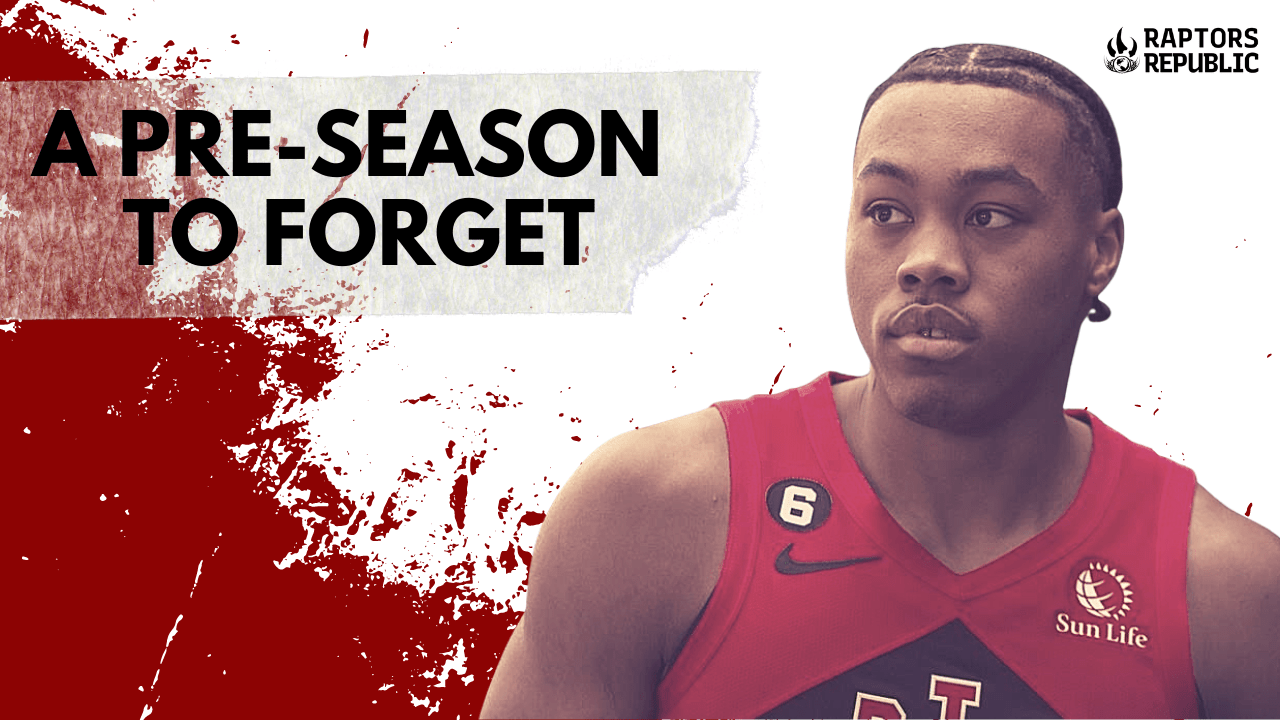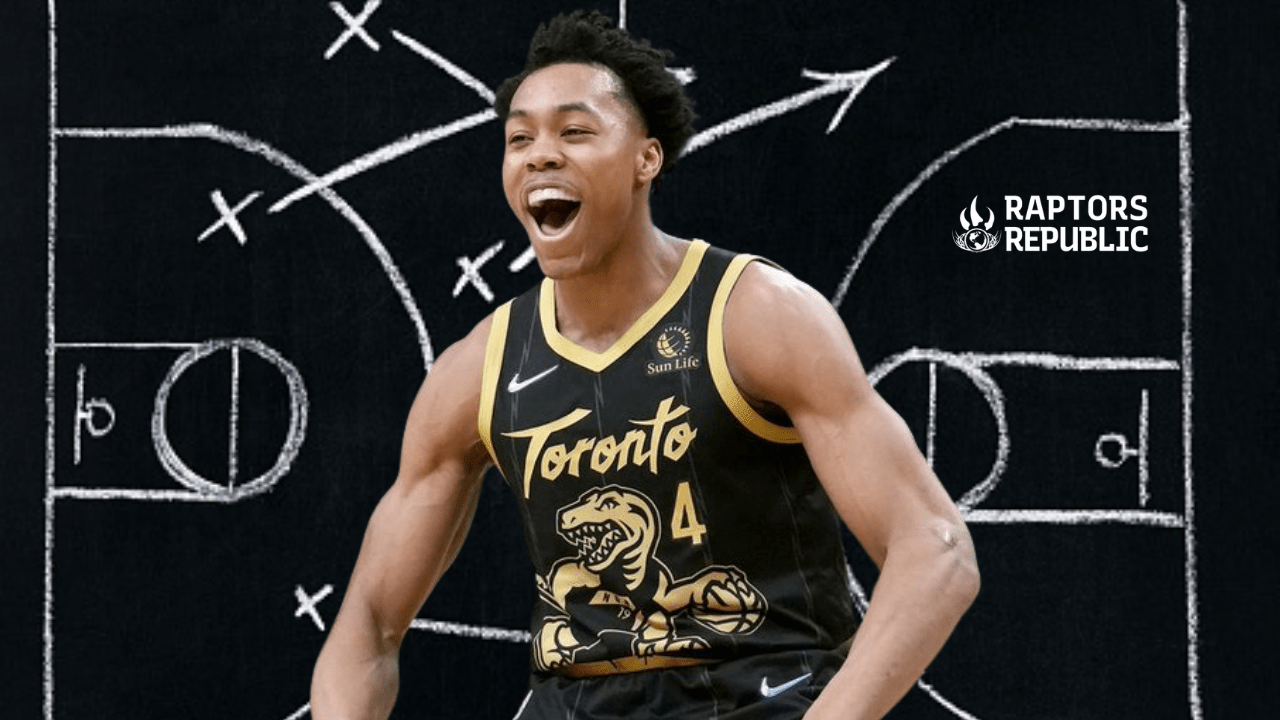There are countless sayings that describe how our own expectations can ruin our experiences.
“If you expect nothing from somebody, you are never disappointed.” – Sylvia Plath
“Don’t let perfect be the enemy of the good.” – Voltaire (probably)
And as sports fans, we are constantly overwhelmed by the weight of own expectations. Their fulfilment breeds short-term jubilation and further, heavier, longer-term expectations; because the Raptors have been surpassing even the most optimistic expectations for several seasons, fans accordingly expect more and more. Which brings us to Scottie Barnes.
Booed out of the gate for not being Jalen Suggs, Barnes quickly became as exciting as exciting can be, from off-hand skyhooks for his first NBA points to flashy drives and look-back dunks. He carries himself with the panache of a champion without having won one. His confidence probably looks like arrogance to opposing fans, but that’s a good thing in the world of organized sports. Barnes won Rookie of the Year and the hearts of all Toronto, and probably not in that order.
When you’re on top of the world, there’s nowhere to go but down. Barnes found that out this preseason. The brunt of Raptors fandom surely hasn’t turned on him, because no one is really watching preseason other than the most die-hard of fans. But eventually fans have a way of turning on those they love the most: the most exciting, the youngest, the most promising — whoever doesn’t immediately fulfill those gaudy expectations. Just ask Fred VanVleet or Pascal Siakam or O.G. Anunoby.
During preseason, process is far more important than results. And it’s important to keep in mind that not a whole lot of players are trying, which makes it difficult to know if someone got faster, for example, or if his defender is just dogging it. But given all the cavalcade of caveats, it’s still shocking how out of place Barnes has looked at times.

While Barnes is still performing in plenty of other areas, his scoring is way down — as is his efficiency from the floor — and his turnovers are way up.
Some of this is almost certainly due to the Raptors offering Barnes a new role. Rather than attacking moving defenses after his teammates have already created advantages — which was largely the case last year — the Raptors have given Barnes the ball and said “do something.” That’s tough. And it results in a lot of meandering, ugly basketball, even for players as exciting as Barnes. Barnes thrives in dynamic atmospheres. The Raptors have not provided one for him, and neither has he been able to create one for himself. He has traded run outs in transition for hesitating drives that end in the midrange this preseason.
Last season, 42.9 percent of Barnes’ 2-pointers were assisted. This preseason, only 25 percent of them have been assisted.
Some of that is Barnes’ own fault. Dalano Banton, as a point of comparison, has thrived in Toronto’s slop. He has attacked with decisiveness and control. Barnes has been almost the opposite, probing, thinking, and ultimately running out of ideas before he reaches the rim. This preseason, he has shot 40 percent from within eight feet on 2.5 attempts per game. Last season he shot 61.5 percent on 6.7 attempts per game. He’s not getting into the paint, largely because of his new role. And when he gets there, he’s not finishing. (That probably doesn’t mean much — we know he can finish.)
There have been some positives. Barnes has hit a pair of fadeaways in the post that tantalize and tease his apparent future superstardom. For the purposes of comprehensiveness and symmetry, Barnes hit one going over each shoulder.
Those are excellent plays! Barnes turning static plays into points is a wonderful step forward, and one that was teased during his ascension last season as well. But more important in terms of laying the seeds for growth would be his ability to actually create advantages. Scoring without an advantage is good. Creating an advantage — especially during preseason when process matters so much more than results — is better.
Thus Barnes’ fadeaways currently function as cherries without a sundae beneath. Until Barnes is creating advantages from a standstill, and driving with force and decisiveness, it doesn’t matter how fancy his post jumpers become.
And that is where expectations must re-enter the conversation. Barnes was never Toronto’s best on-ball player last season. In fact, he was at his best off the ball, not with it in his hands. He was an efficient screener, cutter, rebounding, and runner in transition. (Which, by the way, is how Pascal Siakam broke out in his sophomore season as a member of the Bench Mob.) But those expecting Barnes to become Toronto’s best player have been sorely disappointed this preseason. Of course, you could disagree with that and there’s plenty of sports betting in Canada which will allow you to prove me wrong with rewards.
But were those reasonable expectations? Last season Barnes showed nuggets of on-ball dominance, to be sure. But to expect him to smoothly transition to playing with the ball in his hands this preseason and not miss a beat is missing the trees for the forest. Yes, this is where the Raptors and Raptors fans alike — and probably Barnes himself — want his game to grow. But that doesn’t mean it will simply happen. To be disappointed by growing pains is to be disappointed by the nature of reality itself. Which, that’s fair. But it’s unfair to Barnes.
It has taken Siakam many years to become the player he is today. And fortunately for the Raptors, he is the player he is today, meaning the Raptors don’t need someone else to run the offense. Siakam is almost as good as it gets there. Barnes has plenty of time before the Raptors even want him running the show, let alone need him to.
Preseason is a time of experimentation. Barnes, to be as blunt as possible, has failed in his experiments. But we know where he’s successful, and he hasn’t yet had a chance to thrive in those areas. When the games matter again, Barnes will go back to dominating in dynamic situations, just like he did last season. Eventually, Toronto will need Barnes to grow in static situations. They learned, crucially, that he is probably not yet ready for that. But he’ll have plenty more chances to learn and grow before the Raptors give him the ball and ask him to run the show. Barnes has not failed the Raptors, only our expectations. Which might not have been fair in the first place.



